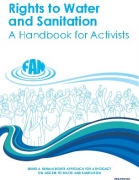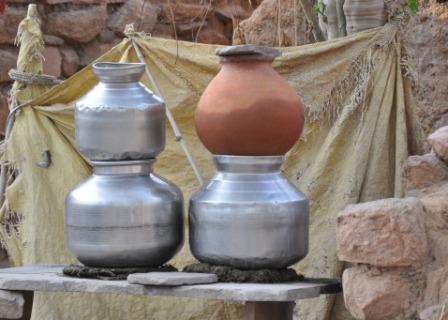Rural Water
Water management through communities in Uttarakhand - Neelima Garg
Posted on 28 Mar, 2011 06:36 PMThe conflict is over how water is perceived, valued and treated. Water is life savior elixir. The importance of water as a vital resource to the life system and an essential component of societal development cannot be over emphasized. Over the years, many ancient civilizations emphasized on various mechanisms of water collection & distribution.
Allocation, release and utilization of funds for safe drinking water in rural and tribal areas under NRDWP for the last three years - PIB release
Posted on 21 Mar, 2011 12:46 PMFunds are released to the States under National Rural Drinking Water Programme (NRDWP) by the Government of India for providing drinking water supply in rural areas covering the rural and tribal areas of the State.
About 30% of rural household’s access piped drinking water from taps. However, full coverage of rural habitations is about 75%.
Pest and disease management in organic, natural, sustainable agriculture - Presentations from the South Asia Conference on "Outstanding Organic Agriculture Techniques", Bangalore organised by OFAI (2009)
Posted on 20 Mar, 2011 06:17 PM This set of presentations from the conference on Outstanding Organic Agriculture Techniques held during September 2009 at Bangalore deals with pest and disease management practices in organic farming, which rely primarily on preventive and integrated methods.
This set of presentations from the conference on Outstanding Organic Agriculture Techniques held during September 2009 at Bangalore deals with pest and disease management practices in organic farming, which rely primarily on preventive and integrated methods.
Crop production and plan protection in organic farming
This paper by S R Sundararaman presents organic farming as the only recourse for farmers, to save both livelihood and the health of the soil. Organic farming methods enable farmers save money and turn their farmyard waste into value-added products for increasing crop production. Farmers will not have to be dependent on agri-business companies for seeds, fertilizers and pesticides. Our self-reliance is thus preserved. A large portion of our country's foreign exchange is used to pay for the import of petroleum products. By going organic we will also help our country save on valuable foreign exchange. Our land will keep giving us returns for extended periods of time unlike farming as per the green revolution, where the land stays productive for a short time and then becomes sterile.
The uppermost question in the minds of farmers who have recently converted to organic farming or who want to turn organic is how to ensure that crop production does not reduce and how to protect the plants from disease, without the chemical fertilizers and pesticides that their fields have grown used to. This paper provides the answers and it also seeks to reassure all farmers that there is no farm which cannot turn around and produce quality crops in sufficient quantity, using organic farming methods.
Conference on "Social Investing to Enhance and Sustain Rural Sanitation Coverage" - WES-Net India, 22nd – 23rd March, 2011, PHD House, New Delhi
Posted on 08 Mar, 2011 12:27 PM Organizers:
Organizers:
- WES-Net India
- FINISH (Financial Inclusion Improves Sanitation and Health)
Venue: PHD Chamber of Commerce and Industry, PHD House, Siri Institutional Area, August Kranti Marg, New Delhi
Topics:
- On Social Investment and MFI in India - The current scenario
- Presenting the Rationale and Results of the FINISH sanitation innovation contest
Demonstration of rural technologies developed by NEERI to stakeholders of the Vidharbha region - National Environmental Engineering Research Institute, 8th March, Nagpur
Posted on 04 Mar, 2011 05:00 PMOrganizer: National Environmental Engineering Research Institute (NEERI)
Venue: National Environmental Engineering Research Institute (NEERI), Nagpur
Society for Rural, Urban & Tribal Initiative (SRUTI) calls for Advocacy Fellowship - Apply by - 20th February, 2011
Posted on 16 Feb, 2011 04:02 PMSociety for Rural, Urban and Tribal Initiative (SRUTI) is a not-for-profit organisation that facilitates social action across rural and urban India towards a more equitable and democratic society that envisions dignity and justice for all.
This short-term fellowship, awarded to 7 applicants, aims to document key issues and struggles for justice addressed by the SRUTI Fellows through their individual efforts and people’s movements in different parts of the country.
The broad areas of work are:
- Right to Natural Resource Livelihood (Jal, Jangal, Zameen)
- Effective Governance
- Education
- Caste Discrimination
- Rights to the City and Education.
The SRUTI Fellows area of work spreads across 12 states: Uttarakhand, Delhi, Rajasthan, Madhya Pradesh, Maharashtra, Bihar, Jharkhand, Chhattisgarh, Orissa, Andhra Pradhesh, Tamil Nadu and Karnataka.
The Advocacy Fellows and films will be mentored and directed by Rita Banerji who has aligned with the SRUTI team to facilitate and monitor the project.
The Fellowship will begin in the first week of March with an orientation workshop to sensitize the selected Advocacy Fellows to the issues on the ground and introduce them to the SRUTI Fellows. The workshop will also mentor and train them to research, script, document and put together the series of films.
Right to water and sanitation - A handbook for activists by Freshwater Action Network (FAN) Global
Posted on 31 Jan, 2011 10:11 PM With tihs, they can improve water and sanitation service regulation and provision at international, national and local levels. Directed primarily at community groups, human rights NGOs, rights-based development practitioners and aid workers, this handbook aims to strengthen human rights-based advocacy by providing innovative and practical suggestions that activists and organisations can use in their work. It also acts as a resource guide for finding further information.
With tihs, they can improve water and sanitation service regulation and provision at international, national and local levels. Directed primarily at community groups, human rights NGOs, rights-based development practitioners and aid workers, this handbook aims to strengthen human rights-based advocacy by providing innovative and practical suggestions that activists and organisations can use in their work. It also acts as a resource guide for finding further information.
Water and sanitation are essential for living a healthy life with dignity. However, around a billion people across the world lack access to a safe and sufficient water supply to cover their basic needs. Over 2.5 billion people lack access to adequate sanitation and nearly 1.2 billion face the indignity of open defecation every day.
The Millennium Development Goal (MDG) target to halve the proportion of people without sustainable access to safe drinking water and basic sanitation by 2015 is seriously off track, with sanitation severely lagging behind. For example, estimates suggest that at current rates of progress, sub-Saharan Africa will miss the MDG water target by about 25 years, while the sanitation target may not be reached until well into the 22nd century.
Ensuring sustainable drinking water security in rural areas - PIB Release
Posted on 28 Jan, 2011 04:40 PM Hitherto the role of the government was that of a service provider, with minimum involvement of the community in the planning process and the implementation activities. With the increase in demand due to public aspirations and decrease of availability of safe water it was considered essential to involve the community in the programme.
To achieve this, there was a paradigm shift and the Framework for implementation of National Rural Drinking Water Programme was revised in 2009. The Department appropriately addressed the soft issues related to facilitating the active participation of PRIs in the process of planning, implementation and operation of schemes to achieve the goal of long term sustainability. It also ensured that the community gets continuous support and handholding so that they are empowered to take up the role of planning and implementing the systems also in addition to operating and maintaining them.






 Rural household saving water at home
Rural household saving water at home